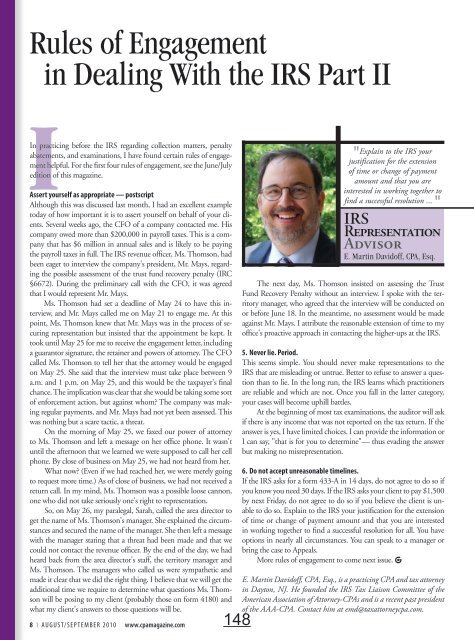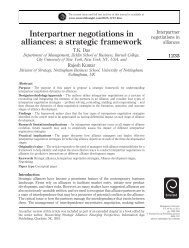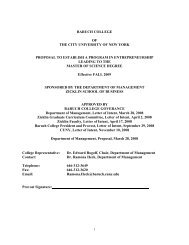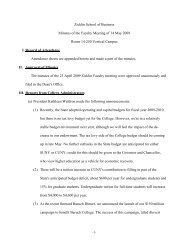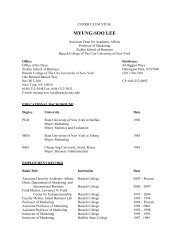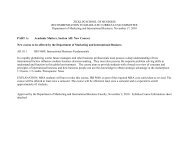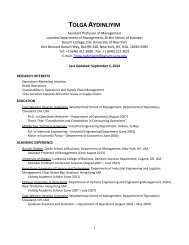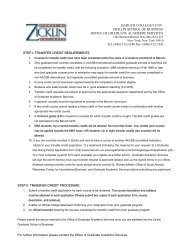Tax Seminar #3 – December 3 2012
Workbook - Zicklin School of Business
Workbook - Zicklin School of Business
Create successful ePaper yourself
Turn your PDF publications into a flip-book with our unique Google optimized e-Paper software.
Rules of Engagement<br />
in Dealing With the IRS Part II<br />
In practicing before the IRS regarding collection matters, penalty<br />
abatements, and examinations, I have found certain rules of engagement<br />
helpful. For the first four rules of engagement, see the June/July<br />
edition of this magazine.<br />
Assert yourself as appropriate — postscript<br />
Although this was discussed last month, I had an excellent example<br />
today of how important it is to assert yourself on behalf of your clients.<br />
Several weeks ago, the CFO of a company contacted me. His<br />
company owed more than $200,000 in payroll taxes. This is a company<br />
that has $6 million in annual sales and is likely to be paying<br />
the payroll taxes in full. The IRS revenue officer, Ms. Thomson, had<br />
been eager to interview the company's president, Mr. Mays, regarding<br />
the possible assessment of the trust fund recovery penalty (IRC<br />
§6672). During the preliminary call with the CFO, it was agreed<br />
that I would represent Mr. Mays.<br />
Ms. Thomson had set a deadline of May 24 to have this interview,<br />
and Mr. Mays called me on May 21 to engage me. At this<br />
point, Ms. Thomson knew that Mr. Mays was in the process of securing<br />
representation but insisted that the appointment be kept. It<br />
took until May 25 for me to receive the engagement letter, including<br />
a guarantor signature, the retainer and powers of attorney. The CFO<br />
called Ms. Thomson to tell her that the attorney would be engaged<br />
on May 25. She said that the interview must take place between 9<br />
a.m. and 1 p.m. on May 25, and this would be the taxpayer's final<br />
chance. The implication was clear that she would be taking some sort<br />
of enforcement action, but against whom? The company was making<br />
regular payments, and Mr. Mays had not yet been assessed. This<br />
was nothing but a scare tactic, a threat.<br />
On the morning of May 25, we faxed our power of attorney<br />
to Ms. Thomson and left a message on her office phone. It wasn't<br />
until the afternoon that we learned we were supposed to call her cell<br />
phone. By close of business on May 25, we had not heard from her.<br />
What now? (Even if we had reached her, we were merely going<br />
to request more time.) As of close of business, we had not received a<br />
return call. In my mind, Ms. Thomson was a possible loose cannon,<br />
one who did not take seriously one's right to representation.<br />
So, on May 26, my paralegal, Sarah, called the area director to<br />
get the name of Ms. Thomson's manager. She explained the circumstances<br />
and secured the name of the manager. She then left a message<br />
with the manager stating that a threat had been made and that we<br />
could not contact the revenue officer. By the end of the day, we had<br />
heard back from the area director's staff, the territory manager and<br />
Ms. Thomson. The managers who called us were sympathetic and<br />
made it clear that we did the right thing. I believe that we will get the<br />
additional time we require to determine what questions Ms. Thomson<br />
will be posing to my client (probably those on form 4180) and<br />
what my client's answers to those questions will be.<br />
8 I A U G U S T/ S E P T E M B E R 2 0 1 0 www.cpamagazine.com<br />
Explain to the IRS your<br />
"<br />
justification for the extension<br />
of time or change of payment<br />
amount and that you are<br />
interested in working together to<br />
find a successful resolution ... "<br />
IRS<br />
Representation<br />
Advisor<br />
E. Martin Davidoff, CPA, Esq.<br />
The next day, Ms. Thomson insisted on assessing the Trust<br />
Fund Recovery Penalty without an interview. I spoke with the territory<br />
manager, who agreed that the interview will be conducted on<br />
or before June 18. In the meantime, no assessment would be made<br />
against Mr. Mays. I attribute the reasonable extension of time to my<br />
office's proactive approach in contacting the higher-ups at the IRS.<br />
5. Never lie. Period.<br />
This seems simple. You should never make representations to the<br />
IRS that are misleading or untrue. Better to refuse to answer a question<br />
than to lie. In the long run, the IRS learns which practitioners<br />
are reliable and which are not. Once you fall in the latter category,<br />
your cases will become uphill battles.<br />
At the beginning of most tax examinations, the auditor will ask<br />
if there is any income that was not reported on the tax return. If the<br />
answer is yes, I have limited choices. I can provide the information or<br />
I can say, "that is for you to determine"— thus evading the answer<br />
but making no misrepresentation.<br />
6. Do not accept unreasonable timelines.<br />
If the IRS asks for a form 433-A in 14 days, do not agree to do so if<br />
you know you need 30 days. If the IRS asks your client to pay $1,500<br />
by next Friday, do not agree to do so if you believe the client is unable<br />
to do so. Explain to the IRS your justification for the extension<br />
of time or change of payment amount and that you are interested<br />
in working together to find a successful resolution for all. You have<br />
options in nearly all circumstances. You can speak to a manager or<br />
bring the case to Appeals.<br />
More rules of engagement to come next issue.<br />
E. Martin Davidoff, CPA, Esq., is a practicing CPA and tax attorney<br />
in Dayton, NJ. He founded the IRS <strong>Tax</strong> Liaison Committee of the<br />
American Association of Attorney-CPAs and is a recent past president<br />
of the AAA-CPA. Contact him at emd@taxattorneycpa.com.<br />
148


